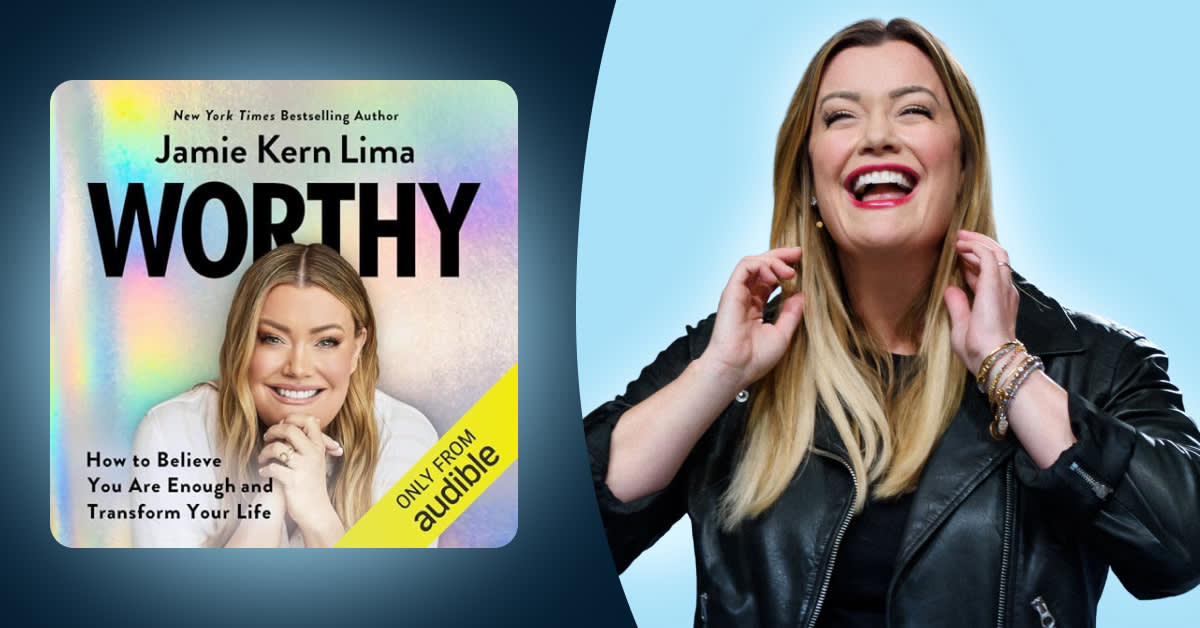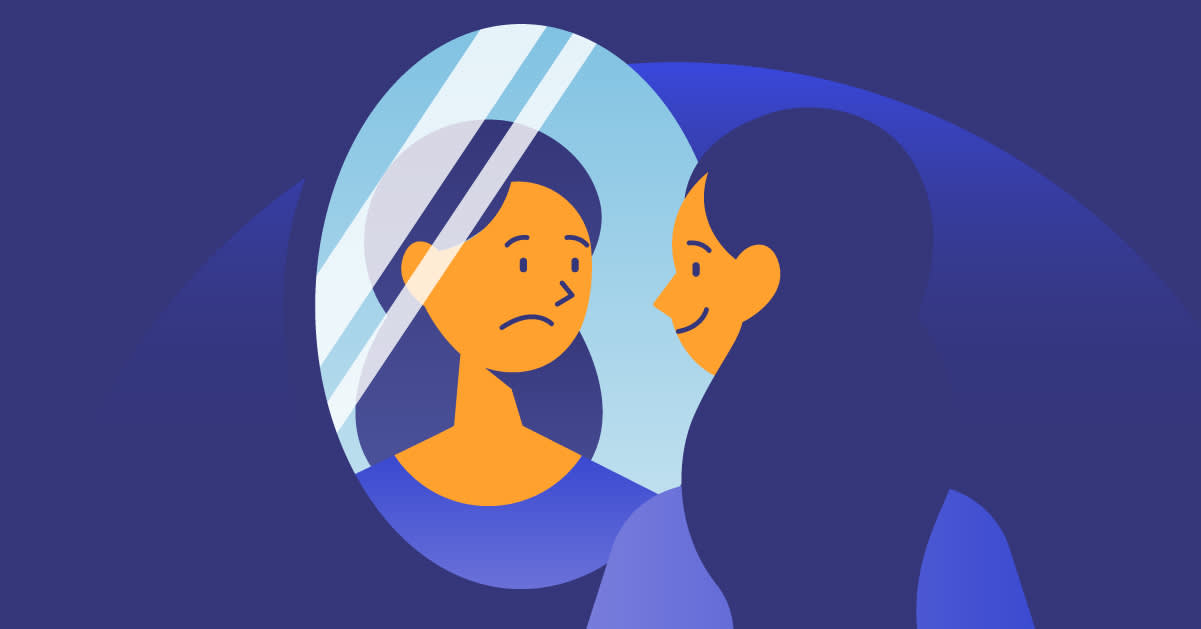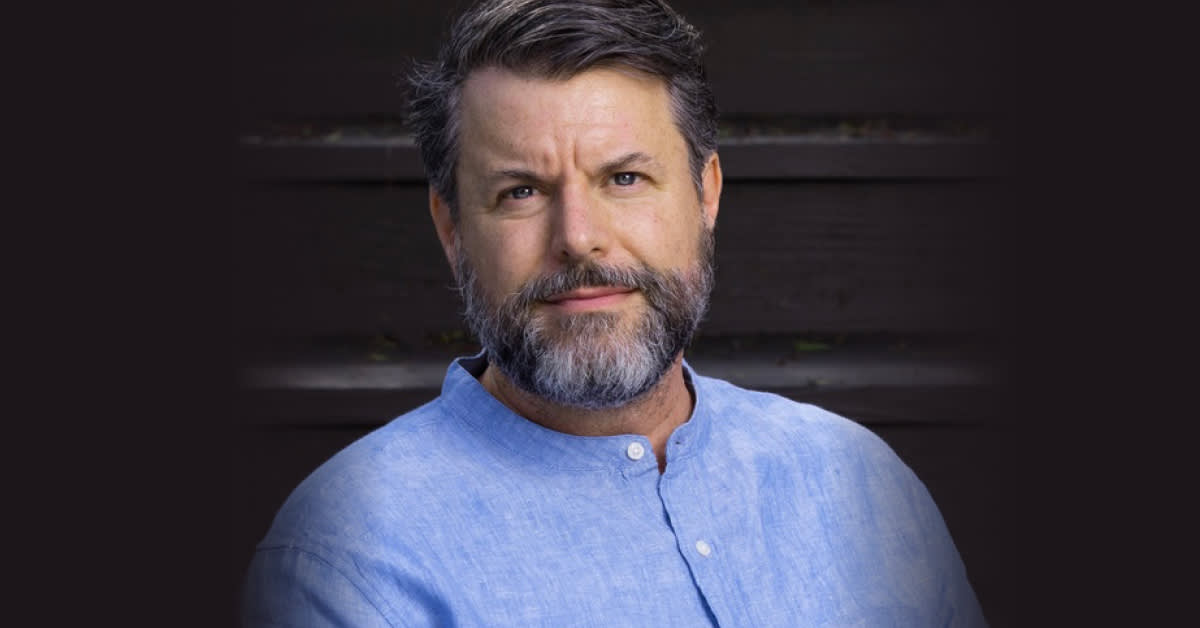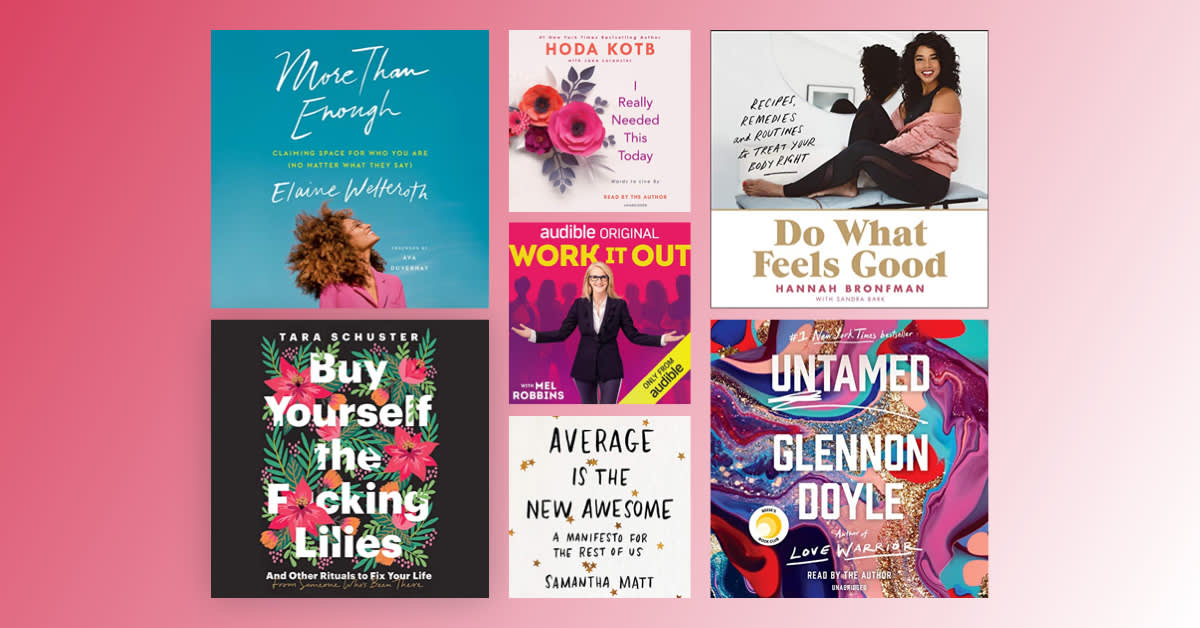I was always taught that confidence built through experience was the most important key to success. But it turns out, that will only get you so far—it’s the unshakable foundation of self-worth that prevents us from holding ourselves back. Worthy: How to Believe You Are Enough and Transform Your Life is a comprehensive guide to building your self-worth and breaking through your personal ceiling to reach your goals in 20 actionable steps. After listening to just a few lines, I knew that I needed to know more about the woman behind the title, founder and CEO of IT Cosmetics Jamie Kern Lima. In this interview, she shares the startling statistics that inspired her to create Worthy, her own self-worth journey as a Denny’s waitress turned businesswoman, the reason it took her four years to text back Oprah, and how she’s paying her success forward now.
Note: This interview was recorded in audio and its transcript has been edited for clarity and length.
Rachael Xerri: Jamie, thank you so much for being here. For starters, who did you write Worthy for, and what impact do you hope it will make on your listeners?
Jamie Kern Lima: Worthy is for every single person who has some self-doubt to destroy and a destiny to fulfill. Right now as we're talking, 80% of women don't believe they're enough; 75% of female executives deal with imposter syndrome; 91% of girls and women don't love their bodies; and 73% of men feel inadequate. And when we believe we are not enough, it is a lie. And it affects every area of our life—our business, our goals, our dreams, our relationships, our joy. So, the time to unlearn that lie has come.
Worthy is packed with over 20 tools on how to build self-worth. And I believe that, for most of us who have doubted we're enough and just dealt with that feeling, our self-worth becomes our ceiling in our lives. When we think about what we hope and dream for our lives, we do not rise to what we believe is possible. We always fall to what we believe we're worthy of.
So, with this idea and all the data to back it up, this is for every person who wants to overcome self-doubt and learn to believe they're worthy exactly as they are, and worthy of their greatest hopes and their wildest dreams. Because it's only by believing we're worthy that they actually come to us in our lives.
I used to believe the lie that if I achieve enough, then I will feel enough.
What are some examples of behaviors or beliefs that someone with low self-worth might have, and what's at stake for them?
You can be crushing it in your life, hitting all these goals, having success in business, having everything look great on the outside. But if underneath it all you feel like you aren't enough, that is when you're dealing with low self-worth. And that is most of us, when you look at the data.
How low self-worth typically shows up is you feel stuck, and you don't know why. Maybe you have a goal to write a book, but you haven't written the first word. Or you're working in a job and you're like, "I really want to run the restaurant, not work in it," or "I really want to start my own thing," but you just stay stuck, and you don't know why. Or you say, "I want to find a life partner," but you're not getting on the dating app, not putting yourself out there or socializing.
A lot of us will tell ourselves, "I'm only stuck because I just need to get more experience," or "I need to build more skill sets, and then I'll get unstuck." And while those things might be true, for most of us the real reason we stay stuck is because, deep down, we actually don't believe we're worthy of the thing. Our self-worth becomes our ceiling. So, low self-worth will typically show up that way.
If you have low to medium or medium self-worth, what that can look like is you'll actually go for the thing. You'll go for it, but then somewhere along the way you hit a ceiling. Like you want to build a six-figure business but it plateaus at four or five figures, and you don't know why. You'll hit a ceiling, or you'll sabotage the thing along the way.
If you have issues with self-worth, here's another way they can typically show up: You do go for it, you crush it, you accomplish that goal or dream or thing you always wanted, but when you arrive at it, you still feel like it's not enough. You still feel like you are not enough. You feel empty, like something's missing, and you don't feel fulfilled.
And then, often we believe the lie of, "I just have to accomplish more and hustle more. If I do more and achieve more and keep going, I'll finally feel fulfilled." But it actually becomes this never-ending thing because in the pursuit of all those goals, we're building confidence along the way, which is important, but doesn't build self-worth. And what's underneath all of this: You don't believe you're enough. No matter what goal you accomplish, no matter the job title, the six-pack abs, the relationship status, the dream car, the number in the bank account, whatever it is, you still take you with you. When underneath it all you do not believe you're enough, you'll arrive at that next goal still feeling like you're not enough.
It is possible to be ambitious, to go after things fearlessly, and actually be fulfilled when you achieve them, when you learn how to have strong self-worth underneath it all.
This leads into something you talk about in your audiobook that really stuck out to me. What is the difference between self-confidence and self-worth? And why do we need both?
I'm so glad we're diving into it because for everyone reading this interview, I hope that they get the Audible [version] and listen to the whole book. But even if you don't, just getting this one concept can shift everything in your life: People think they need more self-confidence, but what they really need is more self-worth. And they are so different.
Most of my life, I did not understand the difference between self-confidence and self-worth. I thought they were the same thing. And so, I spent most of my life, decades of my life, achieving. I used to believe the lie that if I achieve enough, then I will feel enough. And I did that over and over, and over and over, until I learned the hard way that there is a massive difference between self-confidence and self-worth.
Self-confidence, while also an internal trait, is based so much on the external. So, our self-confidence is fragile. Our self-confidence fluctuates. Our self-confidence is how we assess our own skills and abilities, our willingness to try and go for it.
People think they need more self-confidence, but what they really need is more self-worth. And they are so different.
[Confidence can depend] on if we're winning or losing at the time, like they do studies that show the boxer who wins the fight is automatically 30% more confident. Our competence is fragile—it fluctuates; it rises and falls. We see awesome commercials and things that are inspiring, or we have well-intended family and friends who ask, "How's your job? Are you married? Do you have kids yet?" And we think if we get great answers to those questions, we'll finally feel fulfilled and happy. And then we get those things, and we wonder why we still don't feel enough.
It's because we built confidence that's based on us growing, us contributing the things beyond ourselves. And self-confidence is so important in life, but that alone does not lead to fulfillment. Self-worth, on the other hand, is the deep internal knowing and belief that you are worthy of love and belonging exactly as you are, not as your past or your past mistakes or your failures or your regrets. The way I like to describe it, our self-confidence is like the house we're building with all the rooms and the art, and we keep adding to it and making it more beautiful. Our self-confidence is sitting on top of our self-worth, which is the foundation underneath the house, and our house will only ever be as secure as the foundation it's on. So, our self-worth is our foundation.
One thing to add to that is that we're very ambitious people. There's this worry that, “Well, wait a minute. If I learn to believe I'm enough exactly as I am, will I lose my edge? Will I lose my ambition?” No. When you actually believe you are enough exactly as you are, you become more ambitious. Because you become fearless in the sense that you're like, "OK, I might go for the thing and fall flat on my face. It could be a disaster. I could fail miserably, and that might shake my confidence for a minute, but it cannot touch my self-worth. It does not define who I am."" And with that kind of unshakable self-worth, I have found that I am more ambitious now than ever, because I do not fear the things that shake my confidence for a minute. When you have strong self-worth, it changes everything.
It's really incredible. And a lot of what you're saying is so relatable, and I think it's going to resonate with so many listeners. I can't help but wonder what influence has your own self-worth had in your role as founder and CEO of IT Cosmetics. I think many people aspire to get to your level. What was your own self-worth journey like?
So, I have this skin condition called rosacea. And I thought my whole life, I'm going to host a talk show. I love sharing other people's stories with the world. I was working in television news at the time, with the dream of launching my own show, and I got my rosacea, which, for me, is on my cheeks, nose, and forehead. It gets really red and bumpy. And I entered the season of setback in my life. What I know now, by the way, is that so often our setbacks are actually divine setups for what we're actually supposed to do next—we just don't know it at the time when we're going through it. But I went through this big season of self-doubt where I would be anchoring the news, and I would hear the producer in my earpiece say, "There's something on your face. You need to wipe it off." And I knew I couldn't wipe it off. I knew it was the rosacea coming through the makeup.
I started trying to find everything out there to cover it up, and nothing would work. Long story short, I poured every penny of savings I had, along with my husband’s, into this idea, and we launched IT Cosmetics in our living room. What I did not know is that today, IT Cosmetics is a billion-dollar business, right? We eventually grew it to over 1,000 employees and became the largest beauty brand in QVC's history. But the first three years of that journey, we could not afford to pay ourselves a penny. We were told no, over and over, and we went through hundreds of rejections and were teetering on bankruptcy for many years.
I learned how to not equate other people's doubts about my ideas or dreams and let that turn into doubt in my own head. And that journey, for anyone who has dealt with rejections or failures, is in a chapter in Worthy called, “When You Change Your Relationship with Rejection, You Change Your Entire Life.” This chapter was going to be its own book, but I didn't want to wait two years. People need this now. If you learn how to reframe rejection and failure in your life, it changes everything. And the problem when it ties to self-worth is a lot of us have had so many past rejections or failures that we've not only let it shake our confidence, but we've let it take root in our self-worth because we've started to believe, "It's not just I was rejected or I failed. I am a reject, I'm a failure."
So often, our setbacks are actually divine setups for what we're actually supposed to do next.
When we let it take root at that identity level, that's when it impacts our self-worth. What I know for sure, and I don't know who listening needs to hear this, is your past does not determine your future. I don't care how many rejections or failures you've gone through—they are no indication of your potential or your potential success. And so, in my journey, there were tools I learned to apply to navigate these hard times and setbacks, and eventually endure hundreds of them, but keep learning how to turn down the volume on my own self-doubt and turn up the volume on my intuition, and hear that and trust that, and then reframe rejection. Learning how to do this is one of the keys to how I turned this idea in my living room with no money—I was a Denny's waitress before that—into what became a billion-dollar business.
I sold it to L'Oreal for $1.2 billion cash, and they made me the first woman to hold a CEO title of a brand in their 107-year history. The story on the outside, if you just read it in the press, it's like, "That's a fairy tale. She must have gotten lucky." Well, first of all, there's that famous saying: Success leaves clues.
For anyone out there who is in a season of setback or a tough time or feels like they've made too many mistakes, chapter two of Worthy is for you. It's almost like a masterclass on how to reframe and change your relationship with rejection and not only become fearless about it but actually embrace them, fearlessly, and even reframe and revisit past rejections.
Because a lot of us are letting past rejections and failures take root, and they're weighing on us. If you're trying to spread your wings and fly, imagine trying to do it with lead balloons attached to your wings—that's what hanging on to past rejections and failures can feel like. And when we learn to revisit them, reframe them, and embrace future ones, it is life-changing.
If you're trying to spread your wings and fly, imagine trying to do it with lead balloons attached to your wings—that's what hanging on to past rejections and failures can feel like.
Thank you so much for sharing your story. There are 1,000,001 more questions I'd like to ask you, but being mindful of time, I'll keep it to just one more. Before we met today, you mentioned that the proceeds of Worthy are going to something really special, and I was wondering if you could delve into that a bit more here.
Worthy is, I think, the greatest work of my life. Three years ago, even though I had accomplished a lot on the outside, I still did not know why I did not feel like enough. I was still sabotaging things. I share in the book how my lifelong dream was to meet Oprah. I eventually did—I had lunch with her, and she gave me her cell phone number—and then I did not call her for four years. I didn't call her for four years because, while I had a lot of confidence when I met her, deep down I didn't believe I was worthy of being her friend. And when we have self-worth issues, we will start to doubt ourselves out of our own destiny.
I wrote this book for every person who has some self-doubt to destroy and a destiny to fulfill. And I look at the things that have happened in my life just in the past three years when I decided to pick up the phone and call Oprah. And then I taught a course alongside of her. There are so many other examples in my life, but I can't help but think of every person listening to us right now. The moment you learn to believe you are worthy is the moment your current future and past generations of your family change. It's the moment your whole world shifts. It's the moment when you learn to believe you're worthy and that the things you want in your life are possible.
When we have self-worth issues, we will start to doubt ourselves out of our own destiny.
So, I imagine the books that will be written, the friendships that will be formed, the unhealthy relationships that will end, the businesses that will be launched, the ideas that will be birthed and shared—I'm so excited about this book. It's the best work of my life, and 100% of the proceeds are being donated to programs that build self-worth and [empower] girls and women, and also to Feeding America.
I was a Denny's waitress, so I'm very honored and grateful to go from serving meals to donating millions of meals. And my hope and prayer is that for every person who listens to this book, they might post their favorite takeaway and share it with someone else.
My vision for this, why I'm donating all the proceeds, is truly to leave no girl or woman, no person, behind in knowing they're worthy. Because when you believe you're not enough—I don't care who you are—when you believe you are not enough as you are, it is a lie. And that's the most beautiful thing: This book isn't about all the millions of things you have to learn. It's about unlearning the lies that make us believe we're not enough and then igniting and embracing those truths that wake up worthiness.
And you cannot tell who thinks they're not enough on the outside. When you look at the fact that 75% of executives deal with imposter syndrome, this is a deep internal thing that a lot of people do not share. I hope this book helps you feel less alone, more enough, and then gives you a whole toolbox to help you completely break through that barrier of self-doubt, overcome it, and then really step into the person you're born to be. It's only when we believe we are enough, and show up fully in awe of who we are, that we can live in alignment with our assignment and become the people we're born to be. So, I'm super excited for Worthy, and I just want to thank everyone who listens to it and helps share the word, because we're all in this together.







